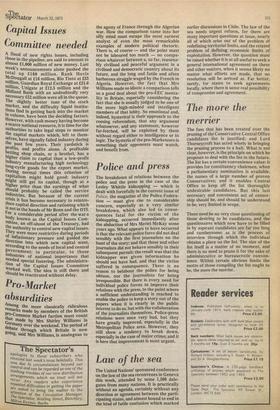Police and press
The breakdown of relations between the police and the press in the case of the Lesley Whittle kidnapping — which is dealt with forcefully in the current issue of Police, the magazine of the Police Federation — must give rise to considerable concern, especially as a very similar breakdown, which also led to consequences fatal for the victim of the ,kidnapping, occurred immediately after the abduction of Mrs Meriel McKay some years ago. What appears to have occurred is that the relevant police force did not deal sensibly with the first journalists on the hunt of the story; and that these and other journalists did not behave sensibly in their subsequent pursuit: the result was that the kidnapper was given information he should not have had, and that the victim suffered in consequence. There is no reason to belabour the police for being obtuse, nor the journalists for being irresponsible. But there is every need for individual police forces to improve their relations with the press, to the point where a sufficient understanding is reached to enable the police to keep a story out of the papers when it is clearly in the public interest to do so, but with the collaboration of the journalists themselves. Police-press relations were once very bad, but they have greatly improved, especially in the Metropolitan Police area. However, they still show a tendency to break down, especially in the case of major crime; and it is here that improvement is most urgent.


































 Previous page
Previous page